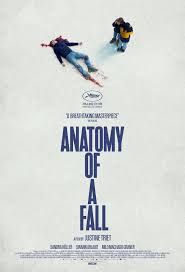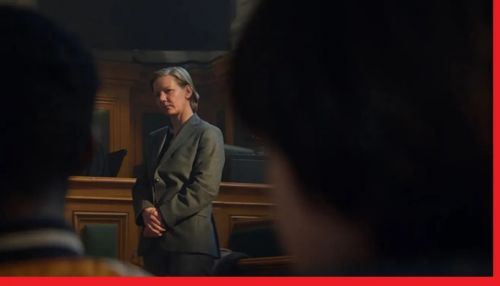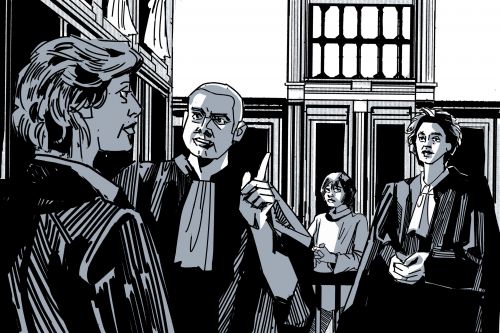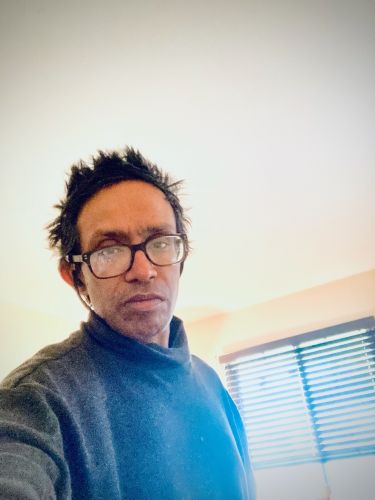Film-Review: Anatomy of a Fall [2023]A Story by Abishai100Cool review/comment of a 2023 award-winner of negotiated/contemplated human thought (or regret) concerning a murder/suicide double-outcome ambiguity jars film.
My film review of the unusual/jarring French legal/crime and psyche noir haunt, Anatomy of a Fall (Justine Triet). Thanks for reading, DISCLAIMER: This review of an established work of cinema offers no commercial/explicit ties to the referenced work (film) itself and all comments and views expressed herein comprise a purely 'personal' expression for social views/reviews (for 'open' comment/critiques/reference). ---- ==== An offbeat and searing portrait of human life and darkness and mystery. Featuring the story of a woman, a writer, portrayed excellently by Sandra Huller, this French film presents the tale of the protagonist burdened writer proving her innocence with somewhat ominous hopelessness concerning the death of her husband, a death which was marked as either suicide or simple bloody murder. The poster for this movie is quite telling of course!  The film scored big at Cannes and won the Oscar for Original Screenplay. In the opening of the story/movie, the writer is being interviewed while her academic world hubby listens to music in the attic. The writer's son takes a walk in the snow with the family-dog and discovers his father's fallen from the top floor window and has died. Some clues surface concerning the husband's pre-fall head wound and the wife/writer (portrayed by Sandra Huller) is accused of homicide and must stand-trial. During the cold trial, the protagonist writer woman confesses she was dismayed at her husband's (indirect) guilt of her son becoming partially blind by accident pre-tragedy.  It turns out the writer's hubby was disconcerted with her wife's emotions and suspected affair with a woman. The writer woman admits on trial she courted the idea of working out personal emotions through her novel writing, but she's suspected of acting out on such inclinations to distance herself from a down marriage by attacking her husband, now dead. Why would he have committed suicide? The crucial turn comes when son Daniel gives testimony about his father making small talk while driving with him (alone) concerning the unpredicted loss of loved ones and states he had hunch of his dad having suicidal tendencies, perhaps because of marriage woes or life/academic/work depression. The writer woman may be acquitted (I won't give-away that ending/detail) and the film ends with her looking brooding before falling asleep next to the family dog. We're still (somehow maybe) left to speculate if the writer woman really did attack her husband, leading to the fall/death; and maybe if it was in accident/self-defense. The film summarizes general thoughts of criminality, accident consciousness for family space pensiveness, and general life-emotion ponderings (hmmm).  This is a haunting and emotionally human portrait of the ponderings of consequences, speculation, family bonds under review, regret and deep thought, and the reliability of the legal process (too) as a notebook for human causality fascination. It's tightly shot, written, acted, and is simple and thought-driven. If you like stories/movies/concepts of emotion and consequence and speculation and inquiry, not necessarily legalese but certainly of legal universe jardinieres, this one's for you. It's a French gem and a Cannes memoir, and it's why I review/like it for my own (perhaps) Selfie-culture modern 'consciousness' notes about life 'drawn' personality-image for decisions and chalk. B+ or 4/5 stars at least! It's an offbeat Valentine's Day rental too I say (Facebook-like!).  "[Anatomy of a Fall]...a cerebral trial drama by the director Justine Triet, opens with a mysterious death in the French Alps...All people are unknowable, the film insists, even to themselves...The most important judge in the room is the couple’s preteen son, Daniel...[and] his poor vision is a metaphor for the struggle to see the truth...Triet’s filmmaking style is deliberate, an unusual approach for a story about ambiguity. She wants the viewer to decide Sandra’s guilt --- she even has a minor character say so outright --- and so she withholds both the answer and the pleasure of feeling like we can figure out" (New York Times). ==== "Money is everything" (Ecclesiastes) © 2025 Abishai100 |
StatsAuthorAbishai100NJAboutStudent/Minister; Hobbies: Comic Books, Culinary Arts, Music; Religion: Catholic; Education: Dartmouth College more..Writing
|

 Flag Writing
Flag Writing